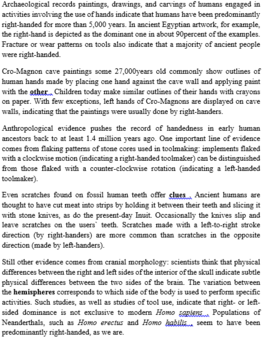Read the following passage and mark the letter A, B, C or D to indicate the correct answer to each of the questions from 43 to 50.
It is estimated that over 99 percent of all species that ever existed have become extinct. What causes extinction? When a species is no longer adapted to a changed environment, it may perish. The exact causes of a species' death vary from situation to situation. Rapid ecological change may render an environment hostile to a species. For example, temperatures may change and a species may not be adapted. Food resources may be affected by environmental changes, which will then cause problems for a species requiring these resources. Other species may become better adapted to an environment, resulting in competition and, ultimately, in the death of a species.
The fossil record reveals that extinction has occurred throughout the history of Earth. Recent analyses have also revealed that on some occasions many species became extinct at the same time - a mass extinction. One of the best-known examples of mass extinction occurred 65 million years ago with the demise of dinosaurs and many other forms of life. Perhaps the largest mass extinction was the one that occurred 225 million years ago, when approximately 95 percent of all species died. Mass extinctions can be caused by a relatively rapid change in the environment and can be worsened by the close interrelationship of many species. If, for example, something were to happen to destroy much of the plankton in the oceans, then the oxygen content of Earth would drop, even affect organisms not living in the oceans. Such a change would probably lead to a mass extinction.
One interesting, and controversial, finding is that extinctions during the past 250 million years have tended to be more intense every 26 million years. The periodic extinction might be due to intersection of the earth's orbit with a cloud of comets, but this theory is purely speculative. Some researchers have also speculated that extinction may often be random. That is, certain species may be eliminated and others may survive for no particular reason. A species' survival may have nothing to do with its ability or inability to adapt. If so, some of revolutionary history may reflect a sequence of essentially random events.
Question 43: The word "it" refers to ___________.
A. extinction
B. species
C. 99 percent
D. environment




Đáp án B
Dịch nghĩa: Từ “it” nhắc tới ___________.
A. sự tuyệt chủng B. loài C. 99% D. môi trường
Giải thích: Thông tin nằm ở “When a species is no longer adapted to a changed environment, it may perish” - Khi một loài không còn thích nghi với môi trường đã thay đổi, nó sẽ biến mất. Như vậy, nó ở đây chính là loài động vật đó.